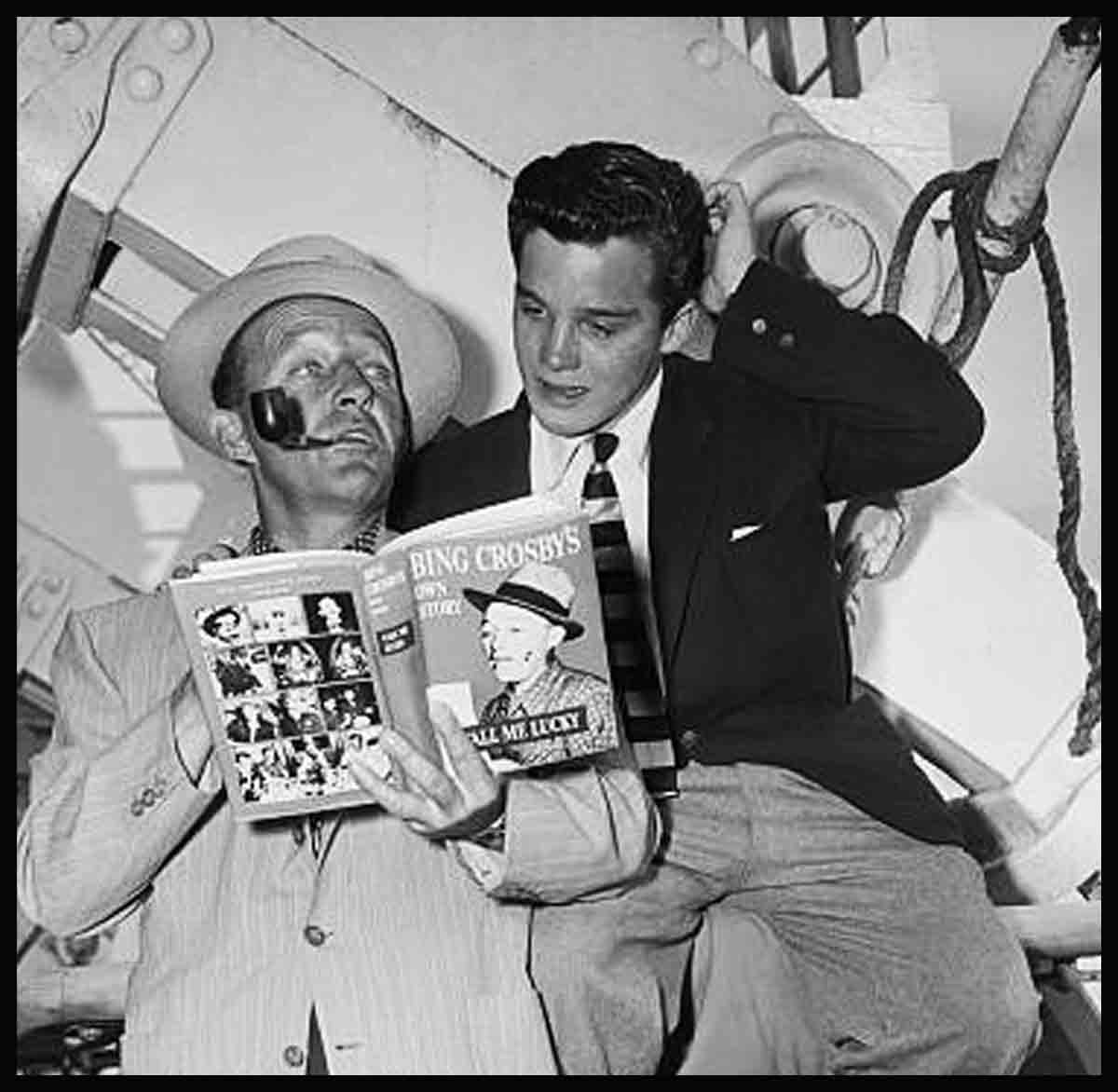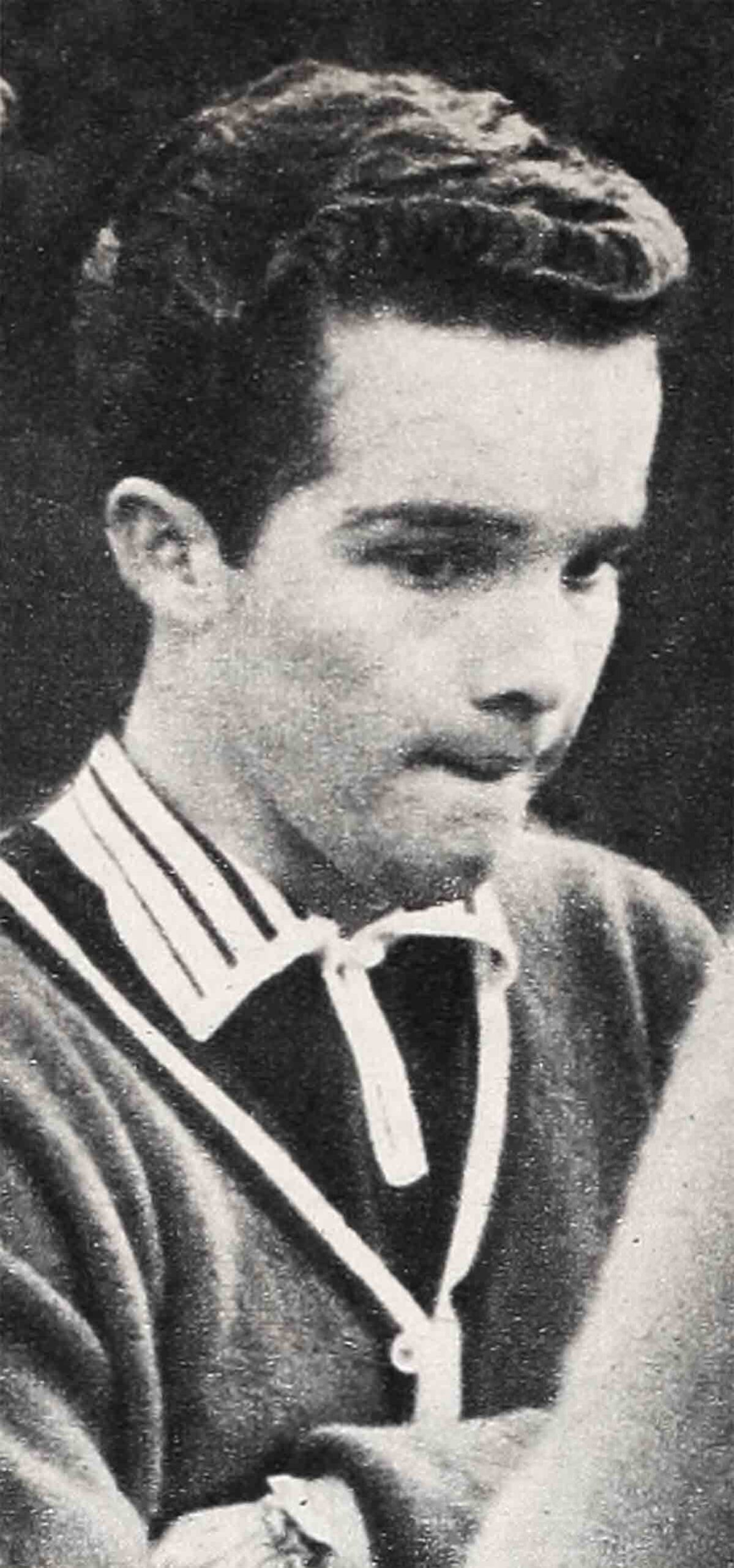
Crack-Up!—Lindsay Crosby
The handsome, dark-eyed young man of twenty-four sat on the edge of a hotel room bed, his hands clutched to the roots of his dark hair. He stared steadily at the floor, oblivious to the traffic outside and the old friend who had just entered the room.
“Come on, Linny, only five minutes till show time. Let’s get with it.” Stocky, forty-five-year-old Pete Pepitto put his broad hands on Lindsay Crosby’s back and shook him gently.
Only then did the youngest of Bing’s sons raise his head. His brown eyes stared up without a sign of recognition. Pepitto, a former Signal Corps officer in World War II, had seen that troubled, agonized gaze in the eyes of men in many hospitals he had visited with Lindsay’s famous father. Quietly, Pete turned toward the door. Minutes later he faced Phillip and Dennis Crosby in their backstage dressing room and announced that Lindsay would not be going on with them that night—or perhaps for many, many nights to come.
Pete Pepitto’s friendship with the Crosby family spans more than twenty years since he first met Bing while working for the Armed Forces Radio. A man of action and rare understanding, he had seen the entire Crosby clan through good times and bad. During the past three years as road manager for the Crosby brothers’ act he has been in considerable measure responsible for their success. When at first they plunged with carefree abandon into the wacky world of night-club life, Pete somehow managed to put the boys back on the right track.
On this significant night, however, Pete was licked, and he knew it. Ten hours after his collapse in a mid-South city, Lindsay Crosby walked into the side entrance of St. John’s Hospital in Santa Monica, California, and was immediately whisked to a private room.
In a sense, Lindsay had come home, for it was at St. John’s that his beloved mother, Dixie Lee Crosby, had waged her year-long battle against the accelerating ravages of cancer. It was here that Bing had endlessly paced the corridors after sharing the bitter secret of the final diagnosis brought to him by his long-time friend, eminent cancer specialist Dr. Arnold Stevens. It was here, too, that Bing himself had been a frequent patient, operated on only months before for a second removal of gallstones, and here that several of the Crosby children and their children, too, had been born.
Lindsay was well aware that at St. John’s, the scene of his mother’s last struggle before she was brought home to die on November 1, 1952, he had found a refuge of hope, and the will to be cured.
No one who was present at the Requiem Mass for Dixie Crosby at the Church of the Good Shepherd in Beverly Hills on that brilliant, sunshiny day a decade before could ever forget the sight of Bing emerging, grief-stricken, from the church, his right arm around the straight shoulders of his manful fourteen-year-old Lindsay. The father seemed to be gaining strength from the boy whose tense face and tearless, troubled brown eyes reflected iron-willed courage and deep faith. Why now, then, a crack-up for Lindsay?
Years ago, crack-ups were widely misunderstood. People sought to hide such illness from friends and enemies alike. Today, happily, such is no longer the case. Today, it is an illness which is understood, an illness which can be cured—completely—as it will be in Lindsay’s case.
“We used to call Lindsay ‘The Little King,’ ” Gary Crosby once told reporter Joe Hyams. “I can still remember him as a kid, sitting silently in the far corner of our big yard and playing all by
himself for most of the long day.”
A schoolmate of Lindsay’s at Loyola High School remembers, “He was a ‘loner.’ He got along with other kids okay, but there was something almost untouchable about him. Once, in a rare moment of confidence, he told me that his greatest ambition in, life was to become a priest.
“If you are Catholic, you don’t make jokes about a boy’s intentions toward the priesthood, like you would if he wanted to be President. Becoming a priest is a vocation of the highest honor, and I told Lindsay it couldn’t happen to a better guy.”
Of all the Crosbys of both generations, Lindsay is the one who has never been subject to criticism either by the press or those close to him. There is something “special” about this lad.
In the first hours after his illness had reached the acute symptomatic stage, Phillip and Dennis Crosby reacted as the mature, straight-thinking men they have fast become. A few short years ago they probably would have been petulant over the fact that Lindsay’s present incapabilities would cost them at least a half-million dollars in show bookings, and that their collective plans for a TV series this fall were dead.
The immediate question for Phil and Denny was: “Shall we tell Bing?” Their decision was no.
Bing, still recovering from his recent operation, was in Honolulu with his wife, Kathy, on his first genuine vacation in years. Besides being upset and flying home to the emergency, what could Bing do? Nothing. And, too, there was a remote possibility that seeing Bing would upset Lindsay more.
As Dennis said, “Only God and the doctors can take care of him.”
So they boarded a plane with their brother who, by finally giving in to mental pressures which had beset him for so long, had given himself a chance to be cured.
Back home, the family doctor told Lindsay’s wife, Barbara, of her husband’s condition. This was a difficult task because Barbara had only recently recovered from the death of their premature baby.
In California, Dennis and Phillip called Gary Crosby, the brother who had broken away from their act. Gary, newly reconciled with Bing, practically blew his top when he heard Bing hadn’t been told, but he finally agreed that the news should come from a doctor. It did. Bing followed the recommendation that he continue his vacation, but the shock was great, for the closeness of father and son was known to everyone.
This latest Crosby crisis was not one that Bing could handle with ease. He must now think back once again and wonder, speculating to what extent, if any, he was responsible for the torment in his youngest son. A portion of the blame for the continuing distorted picture of Bing must rest with Bing himself, for he has seldom given the press an open opportunity to present the honest picture of himself as a father and a man. While throwing a screen around his activities and convictions, Bing nevertheless has been known to toss caution to the winds and “pop off” as he did a few years ago when he told a syndicated reporter that he believed he had failed his sons by giving them less time and attention and more money and discipline than they deserved. It was brave of him to admit it.

Bing: He tried
Bing has probably worked harder at the proper upbringing of his children than most fathers, even if he hasn’t always been able to understand and cope with their problems.
In his own deep grief over the death of Dixie, Bing did not lose sight of the fact that her passing left his youngest boy stricken. A few months afterward, he took Lindsay on an extended trip to Europe where they played golf and strived for a closer father and son relationship. Kindly as Bing’s intentions were, this might not have been what Lindsay’s inner wishes were at the time. A bright lad, he was well aware of the tensions between Bing and his other brothers. He may have secretly resented being singled out as the one who needed help and wished that his brothers were with them on this important holiday.
Of the whole family, Lindsay had spent more time than any of them with his mother in the years preceding her illness and the months prior to her death. With his brothers away at school and Bing finishing a picture at Dixie’s urging, Lindsay was the one who was constantly at her side during those final days. Who is to say what passed between mother and son? Dixie, it has been said, was never told that she was dying of cancer, but there is considerable doubt that this assumption is true. She could very well have been aware, between the ministrations of priests and the close observation of doctors, that she didn’t have long to live.
How normal it would be, then, for her to have talked to her youngest son, knowing that the older boys would soon be away from home for good, and in her intense love for her husband have said to Lindsay. “Stay with your dad, he’ll need you.” Many a boy has thus assumed a responsibility which he could not in fact fulfill.
In his important work, “The Adolescent Years,” William W. Wattenberg, in commenting on he effect of the death of a parent, writes: “Often, of course, death is followed by whole-hearted mourning. Then the family pitches in to establish new routines, and in a few months, on the surface at least, has worked out a new adjustment.
“Another common pattern is built around the young person’s idealization of the parent. The good qualities of the dead person are amplified in imagination. Actions are judged by how he or she is imagined to view them from heaven. Such idealization may provide young people with a personal goal in life. It can also cause terrific emotional storms if the live parent contemplates remarriage.”
If one agrees with this simple premise, there is a clue to Lindsay Crosby’s temporary predicament.
Speculation might be that in his subconscious he feels that he did not live up to his mother’s wishes, which if expressed in moments of extreme pain, were not binding, though he could readily believe them to be. Or, what of his earlier desire to become a priest? Speculation might also be that in bis subconscious he feels he did not live up to God’s wishes.
Only once did Lindsay stage a surprise revolt. Early in 1958, a few months after his father had wed Kathy Grant, Lindsay quietly left home and went to live with Gary, assuring his brother “in exile” that Bing knew what he had done. According to Gary, at the time, Bing disowned them both. Even when Lindsay returned at Christmas time with gifts for the family, it was reported that he was turned away with his armful of presents and told that he wasn’t wanted. Naturally, it hurt!
An unfortunate predicament
Bing, at the time, had not mellowed in his understanding of his sons. He was harshly disappointed at their seeming rejection of him, probably feeling that they were inflicting punishment because of his marriage to Kathy. Nothing could be more untrue, for today each of the boys admire and respect their father’s young wife.
What will the future hold for the most devoted and least selfish of all the Crosbys? Lindsay Crosby will find that out to his lasting satisfaction if he will pursue the recommendations of his doctors, for there is nothing shameful about psychiatric treatment.
A long-time close friend of the family sums up the situation well when he says, “The Crosbys are a kaleidoscope of all American families with highs and lows, bright colored moments of great happiness and dark hues from emotional outbursts taken too seriously. The experience Lindsay Crosby is going through now may weld them all together in permanent love and affection.”
And that is how it should be.
THE END
—BY JIM FLEMING
It is a quote. PHOTOPLAY MAGAZINE NOVEMBER 1962





No Comments